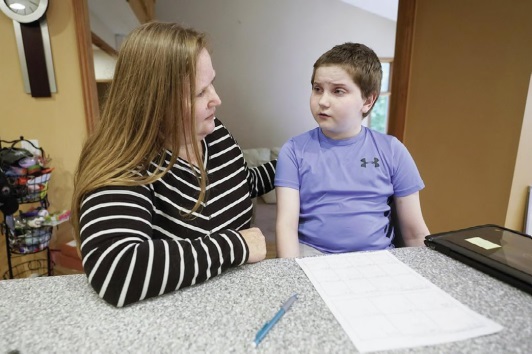WHEN YOUR DISABILITY GETS YOU SENT HOME FROM SCHOOL: STUDENTS WITH DISABILITIES ARE OFTEN MET WITH OFF-THE-BOOKS SUSPENSIONS
BY MEREDITH KOLODNER AND ANNIE MA
The phone call from her son's school was alarming. The assistant principal told her to come to the school immediately.
But when Lisa Manwell arrived at Pioneer Middle School in Plymouth, Michigan, her son wasn’t sick or injured. He was sitting calmly in the principal’s office.
John, who has ADHD and finds it soothing to fidget during class, had been removed from the classroom after he refused to stop using a pair of safety scissors to cut his cuticles.
When she asked why he couldn't stay for the rest of the day, Manwell said the school told her they would call child protective services if she didn't take him home.
The call was just one of a dozen that Manwell received last fall telling her John couldn’t stay in school because of behaviors she says stemmed from his disability. Many schools have promised to cut down on suspensions, since kids can’t learn as well when they aren’t in class. But none of these pickups were ever recorded as suspensions, despite the missed class time.
The practice is known as informal removal, defined by the U.S. Department of Education as an action taken by school staff in response to a child's behavior that excludes the child for part or all of the school day – or even indefinitely.
Excessive use of informal removals amounts to a form of off-the-books discipline – a de facto denial of education that evades accountability, advocates and legal experts say. It has special implications for kids with disabilities: Informally removing these students circumvents federal law that protects them from being disciplined or barred from class for behaviors related to their disability.
Since the pandemic began, parents of kids with disabilities say the practice is on the rise, denying their kids their legal right to an education.
“This is a repeat issue that we see in enforcement across the country, over years,” said Catherine E. Lhamon, assistant secretary for the department’s Office for Civil Rights. “And that means that the practice has taken hold in a way that is dangerous for students and needs to be addressed.”
In July, the department issued guidance on discriminatory practices in discipline for students with disabilities. Lhamon said the guidance included informal removals because of how often they appeared in the office's investigations of complaints against school districts. Informal removals can happen through frequent parent pickups, shortened school days or hours spent in "time-out" rooms.

REAL DEAL: Lisa Manwell was summoned repeatedly in the middle of the day to pick up her son John when he attended Pioneer Middle School last fall.
The Associated Press and The Hechinger Report interviewed 20 families in 10 states who described being called repeatedly and at all hours of the school day to pick up their children. In some cases, parents were called less than an hour into the school day. Others said they had to leave work to get their child so frequently they lost their jobs. Many felt they had no choice but to change schools, or even districts.
Because the removals aren’t recorded, there’s no way to quantify how often they happen. But the National Disability Rights Network says it has seen an increase during the pandemic.
Teacher shortages mean there are fewer staffers available to do evaluations and provide services for students with disabilities, creating “more of an incentive or more of a push for getting kids with behavioral needs out,” said Dan Stewart, the organization’s managing attorney for education and employment.
Students of color with a disability appear to be disproportionately affected based on anecdotal reports to the network from disability rights advocates around the country.
Children are not supposed to be removed from classrooms for extended periods of time without recording the action as a suspension, although it happened to John Jinks a dozen times last year. Credit: Paul Sancya for The Associated Press
"It's pervasive," said Ginny Fogg, an attorney at Disability Rights North Carolina, "And the reason for that is that most parents don't know their rights, and the consequence for the school system is not enough to make them not do it.
"The remedy isn't, 'You just can't go to school,'" she added. "The law was enacted 50 years ago to prevent this very outcome — that students with disabilities aren't allowed to go to school and participate in an education."
Manwell said the calls from her son's school felt relentless.